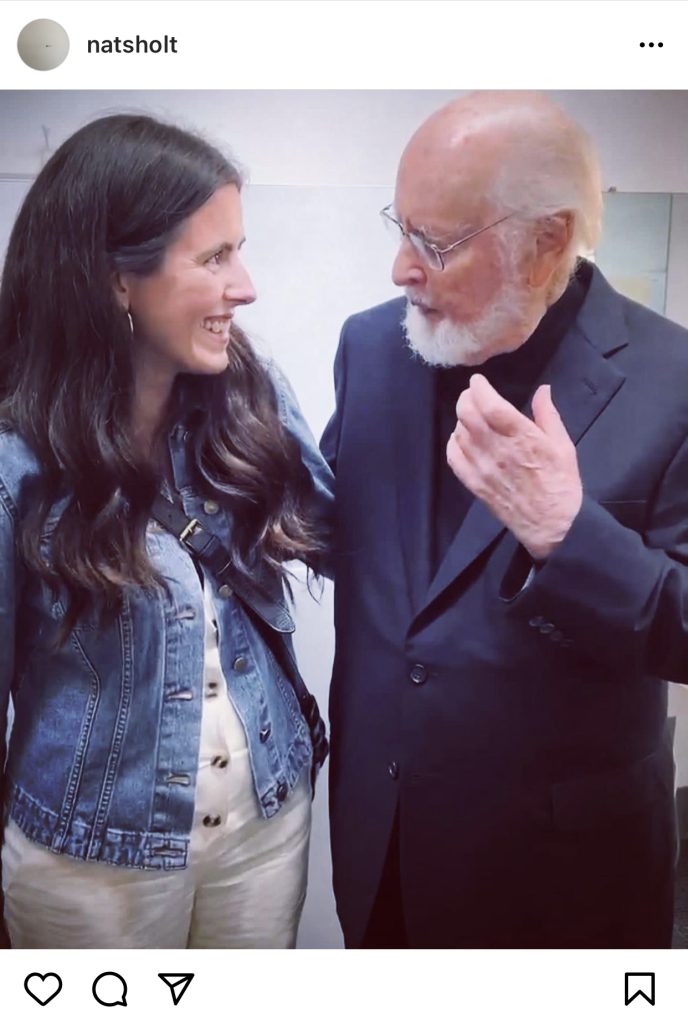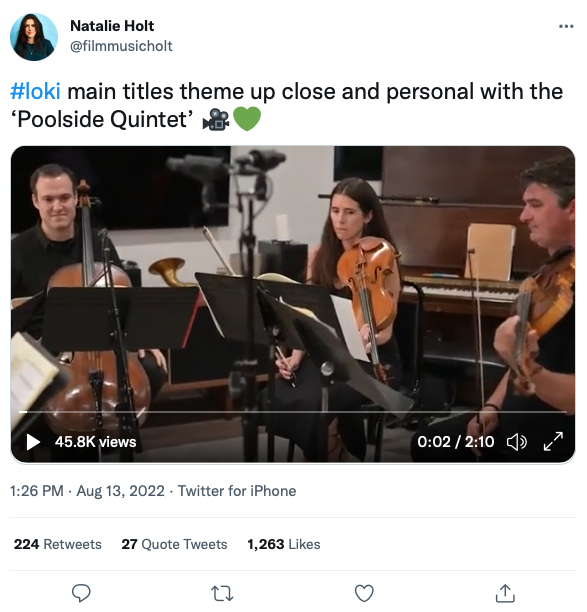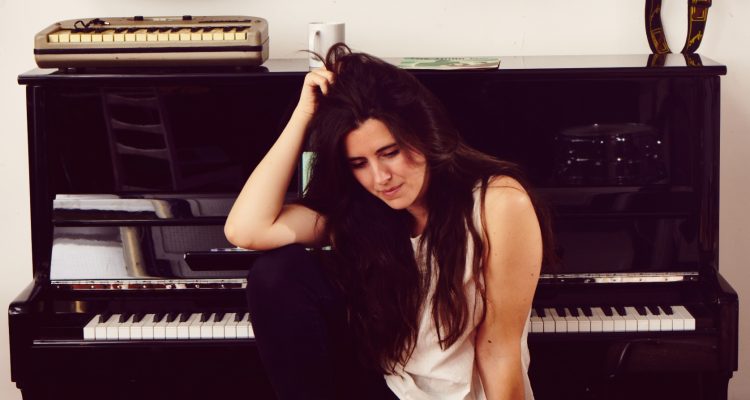In May, Marvel boss Kevin Feige announced that Loki was the most streamed Marvel series of all time. It’s an impressive feat for the God of Mischief’s television debut, and there’s no question that Natalie Holt’s inventive score played a significant role in boosting that statistic.
Series lead Tom Hiddleston played cues from Holt’s score on set, using the music as a key element in heightening the emotional journey of Marvel’s conflicted and beloved villain into a conflicted and beloved hero. Hiddleston hasn’t been shy about his admiration for Holt’s work, citing her songwriting abilities during a recent Jimmy Kimmel Live appearance.
Prior to her work as a composer, Holt performed with the likes of Coldplay, Ed Sheeran, and some of the world’s most renowned touring musicians. Having reached the top one percent of her field, the classically trained violinist aimed her focus on writing music for the screen with new and exciting filmmakers.
In the last two years, Holt has more than achieved that goal with collaborators Kate Herron (Loki) and Deborah Chow (Obi-Wan Kenobi). The two directors have offered high praise for Holt’s recent work, as have the members of the Television Academy.
With Loki’s two Emmy nominations in 2022 for Outstanding Original Main Title Theme Music and Outstanding Music Composition for a Series (in addition to earning a 2022 BAFTA nomination), Holt has become the most nominated composer in Marvel Studios television history.
It’s hard to imagine that this career-defining moment can be traced back to a centuries old candle shop just south of London. However, that charming venue is exactly where Holt crafted her brilliant Loki score, working with musicians over zoom and playing several parts herself in her upstairs studio.
Unlike many composers who run a team of workers inside a massive building, Holt maintains a hands-on approach in her home studio, balancing work across multiple countries and time zones while raising a child.
During the first months of the pandemic, Holt’s primary occupation was homeschooling her five-year-old daughter. Not long after the pair had established a rhythm for home schooling, the opportunity for Loki came round.
“Most days I’d set her off with school work downstairs, do an hour on Loki, and then go back down and assess the progress,” says Holt. “Some days she got more accomplished than I did (laughs).”
Pandemic production delays ultimately gave Holt a year to work on Loki’s score, exploring instrumentation and sound manipulation in that luxurious timeframe.
With Disney+’s Obi-Wan Kenobi series, Holt had fewer than three months to craft the score. That stark contrast in scheduling was certainly felt amid the pressure of nailing a Star Wars project.
Holt spent her days and nights writing relentlessly in Los Angeles, far away from her family and minutes from the Newman scoring stage where Obi-Wan would record.
Working hand-in-hand with director Deborah Chow, Holt built a charming and — at times — disturbingly scored series that is nicely sandwiched between Star Wars Episode III and Episode IV.
“Using the hunting horn for Vader as he stalks Obi-Wan was really a key moment,” shares Holt. “The sound design during that rampage is quite haunting, it’s a texture you don’t often hear in Star Wars.”
Holt referenced how the music pulls back during Vader’s killing spree, allowing director Deborah Chow to isolate the inhale and exhale of Obi-Wan and Darth Vader. “Having the two characters’ breaths connect like that on an inhale and exhale was a brilliant idea,” says Holt.
Landing a Star Wars project is a major career milestone for any composer, but Holt’s Obi-Wan score made her the first female composer in the history of the beloved sci-fi franchise.
Despite that fact, Holt never wanted that particular distinction to distract from the work itself. For her, the greatest honor was working alongside Oscar winning Star Wars composer John Williams.
“Like many children, the music of John Williams underscored my childhood,” says Holt. “With Obi-Wan, I wanted to create something on an epic scale that paid homage to John’s Star Wars while having a contemporary flavor. That process of working with my hero and also bringing my own voice to the show has been unspeakably rewarding.”
Likely penning his final contribution to Star Wars lore, Williams wrote Obi-Wan Kenobi’s main theme (which is musically referenced throughout the series by Holt).
Holt stayed true to her word, writing new themes for the inquisitors, new planets, and even young Princess Leia — while respecting Williams classic work. “In the finale, we definitely utilized the classic Star Wars themes,” Holt says. “Deborah (Chow) felt that it was earned once Vader reveals that he was the one who killed Anakin Skywalker.”
Holt’s dream of meeting her ninety-year-old idol came to fruition at this year’s Star Wars Celebration in Anaheim, California.
Ahead of the Obi-Wan Kenobi premiere, Williams surprised thousands of fans by conducting a full orchestra for a half-hour performance. Williams opened with his new Obi-Wan theme before playing his classic Star Wars themes and his Indiana Jones theme for special guests Harrison Ford and James Mangold.
After the performance, Holt had a private meeting with Williams in his dressing room. “When I told John (Williams) that he was the reason I’d become a film composer, he laughed and said, ‘Oh dear, I’m so sorry about that!’” Holt jokes.

Holt returned to Los Angeles in August to perform a night of Mozart chamber music along with her Emmy nominated Loki main titles theme (The T.V.A theme). The recently formed “Poolside Quintet” gave the packed audience a night to remember, with clips available on Holt’s social media:

Following that performance, Holt spoke to Awards Focus about Loki’s journey from her home studio to the Emmys, defining the sound of Obi-Wan, and the surprise Batgirl nod that would’ve blown fans away.
Awards Focus: Do you remember where you were when you got word about Loki? How quickly did your life change, outside the general shifting insanity of the pandemic?
Natalie Holt: I was driving with my family when I got word about Loki, so in the car passing a farm I think (laughs). It was still fairly early in the pandemic, but deep enough in that I’d formed a bubble with my mom, who is a school teacher.
We were doing school from home with my daughter when Loki came along, and thankfully we had good rhythm established by that point.
Most days I’d set her (the daughter) off with school work downstairs, do an hour on Loki, and then go back down and assess the progress. Some days she got more accomplished than I did (laughs).
AF: This Marvel series has several great relationships among its characters, particularly the relationship between Tom Hiddleston’s Loki and Owen Wilson’s Mobius. The interrogation scene in episode one really instigates the evolution of Loki’s character that we track across all six episodes.
It’s such a pivotal scene, but it’s also the scene that Marvel sent you to score prior to hiring you. Can you share any details on how you approached the scene?
Holt: You’re right, that was the pitch scene that Marvel sent out. When I look back on what I submitted and compare it to what actually ended up in that scene, I definitely scored through all of it the first time.
Kate (Herron), the director, gave a really great note about letting Tom and Owen’s chemistry live on its own for much of the scene… the less is more approach brought a nice balance to the final version of it.
AF: When building the sound palate for Loki, what string instruments were you drawn to to evoke that Nordic sound? I imagine your expertise in string instruments is particularly helpful when recording with the string players on your scores.
Holt: The mythology of Thor and Loki comes from Norse mythology, so the sound of Asgard became something a little folky and mournful, particularly when Loki is connecting to his mother and seeing her death. The string instruments that really gave it that defining sound were the nyckelharpa and Hardanger fiddle.
As far as being a string player myself, it does give me a shorthand when I’m working with an orchestra. I’m still getting there with the brass and woodwinds, which I freely admit.
The other advantage from my time playing and touring is that I have so many talented musician friends. I can just ring someone up and have them lay down some brilliant solo tracks quite easily.
AF: From Loki to Obi-Wan Kenobi, you’ve scored your biggest projects to date during the COVID pandemic. That must present a particular set of challenges, but were there any advantages to mainly working over zoom?
Holt: Weirdly, I think that people were more tolerant of things over zoom, and it allowed for a greater focus on the creativity of the process. It’s certainly much easier to work on a zoom call than having to fly across the Atlantic for meeting after meeting.
Being able to work on a show while being a mom was a massive gift for me, and I hope that elements of this aren’t lost as everything returns to normal. If it weren’t for the pandemic, it’s possible that they wouldn’t have considered a U.K. based composer for Loki. Looking back, all this just reminds me how fortunate I am to have gotten this job.
AF: What do you remember about meeting John Williams and that first conversation?
Holt: Like many children, the music of John Williams underscored my childhood. So, to have scored a project that has his musical heritage embedded in it, it’s something very special to me. Although when I told John that he was the reason that I’d become a film composer, he laughed and said, “Oh dear, I’m so sorry about that!”
AF: That’s certainly more humble than hearing “You’re Welcome” (laughs). Looking back at Obi-Wanand your contributions to Star Wars’ musical tapestry, can you share a few moments that meant a lot to you?
Holt: With Obi-Wan, I wanted to create something on an epic scale that paid homage to John’s Star Warswhile having a contemporary flavor. That process of working with my hero and also bringing my own voice to the show has been unspeakably rewarding.
At the same time, there were new characters and elements that are not so familiar to many people, particularly the Inquisitors, some new planets, and a very young Leia. Writing the young Leia theme was such a joy and that actress is just delightful. She and her mom have made friends with my daughter and me, and we’ve had a really nice playdate over the summer.
AF: That’s amazing, I’m sure the fans will get a kick out of that, it’s so endearing!
Holt: I hope the fans feel satisfied after having seen the finale, I know there was a bit of demand for the Imperial March theme prior to the finale, but Deborah (Chow) was very insistent that it be earned in that closing battle between Vader and Obi-Wan.
Deborah felt that it was earned once Vader reveals that he was the one who killed Anakin Skywalker. That’s when he earned his theme, that’s the Vader that we know.
AF: You did have an iconic Vader moment in episode three, when he’s stalking Obi-Wan and killing the townspeople viciously.
Holt: We were using a hunting horn for Vader as he stalks Obi-Wan… the sound design during that rampage is quite haunting, it’s a texture you don’t often see in Star Wars. I have a bit of the hunting horn recording on my instagram wall.
Deborah (Chow) was very clear about when she wanted to pull back the score, so you have Obi-Wan and Vader’s breathing as the only sounds… having the two characters’ breaths connect on an inhale and exhale like that was a brilliant idea.
AF: Aside from the action and adventure, what do you hope people take away from the latest Star Wars story?
Holt: Ultimately, it’s an emotional score. I watched the original Star Wars trilogy with my dad when I was five years old, and that powerful memory that has taken on additional meaning for me in recent times because he is now very ill and losing his own memory.
I hope the score is something that he would be proud of, that John Williams feels is harmonic with his own incredible work, and that Star Wars fans across the world feel embraces the continuing journey of this incredible story world and its rich musical heritage.
AF: It’s clear you have a love and respect for “heritage music” or score continuity per the John Williams discussion. Did you have a similar line of thinking regarding Batman’s theme in DC’s now-shelved Batgirl film?
I ask because you had Michael Keaton reprising his role from the Tim Burton and Danny Elfman films.
Holt: I’d actually reached out to Danny Elfman and asked for permission to use his Batman theme in the film, and he was quite delighted to have it continue on with Michael’s version of the character.
That was one of the easter eggs that I was hoping to include with my original score for the film. In the past weeks, it’s been really nice to see all the fan love for the project since it’s been halted.We’ve spoken so much about my daughter, she actually had a role in the film as a ballet dancer. We got to go to the Batgirl set last Christmas to film and it was a really nice trip. I’ve realized that she quite likes acting and she’s quite good at it.


